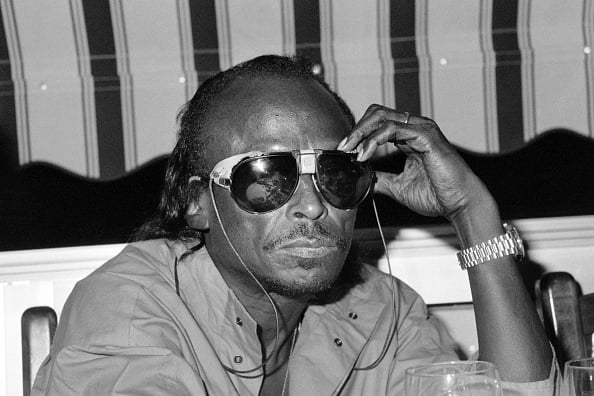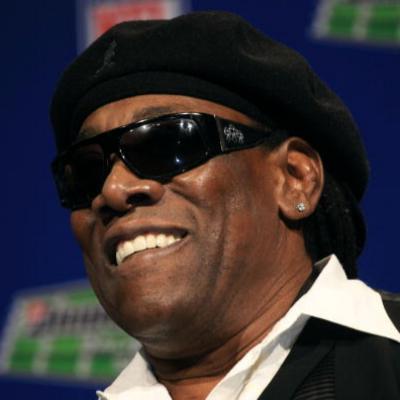What Was Miles Davis' Net Worth?
Miles Davis was an American musician, bandleader, and composer who had a net worth of $19 million at the time of his death. During his career Miles Davis released dozens albums through the labels Prestige, Blue Note, Columbia, and Warner Bros. Miles also recorded albums as a sideman for Charlie Parker, Billy Eckstine, Charles Mingus, Sarah Vaughan, Sonny Rollins, Leonard Bernstein, Rene Urteger, Cannonball Adderley, Betty Davis, Chaka Khan, Quincy Jones, Dizzy Gillespie, Chick Corea, and Louis Armstrong.
Davis' 1959 album "Kind of Blue" was certified 5x Platinum and sold more than four million copies in the United States. In 2009, the U.S. House of Representatives recognized and commemorated the album's 50th anniversary. Davis published the book "Miles: The Autobiography" in 1989, and he was posthumously inducted into the Rock and Roll Hall of Fame in 2006 as "one of the key figures in the history of jazz."
Miles passed away in September 1991 at the age of 65.
Estate Value and Inheritance
Though it has been reported that Miles was worth just $1 million at the time of his death, that information is often misinterpreted. According to his last will and testament, as filed by his heirs in 1991, Davis' estate was "valued at more than $1 million." Many publications have since reported this as Miles being worth $1 million at the time of his death.
New York does not require exact figures when the estate is valued at more than $1 million. According to our research, Davis' liquid assets and the present-day value (in 1991) of his future royalty stream, was $10 million. That's the same as around $19 million today.
According to his will, Miles left 20% of his estate to his daughter Cheryl, 40% to his son Erin, 10% to his nephew Vincent and 15% apiece to his brother Vernon and sister Dorothy. For reasons unknown, he cut out two sons; Gregory and Miles IV. He also cut out his half-brother, Joseph, and his three ex-wives, including actress Cicely Tyson.
Early Life
Miles Davis was born Miles Dewey Davis III on May 26, 1926, in Alton, Illinois. He was the son of dentist Miles Dewey Davis Jr. and violinist/music teacher Cleota Mae Henry, and he had two siblings, Dorothy and Vernon. The family owned a 200-acre property in Arkansas that included a pig farm, and the children hunted, fished, and rode horses while visiting the estate. The Davis family relocated to East St. Louis, Illinois, in 1927 and lived in a commercial building in a predominantly white neighborhood. Miles attended John Robinson Elementary School and Crispus Attucks, and he excelled in music, math, and sports. In 1935, a friend of Davis' father gave Miles his first trumpet, and he took lessons from Elwood Buchanan, who he would later refer to as "the biggest influence on my life." Davis said of his early years, "By the age of 12, music had become the most important thing in my life." After his father gave him a new trumpet for his 13th birthday, Miles began playing with local bands and taking additional lessons from St. Louis Symphony Orchestra trumpeter Joseph Gustat.
Davis joined the marching band at East St. Louis Lincoln High School and entered music competitions, and he said that he experienced discrimination in the competitions because of his race. As a teenager, he began learning music theory and played at the Elks Club with his band. He joined the Rhumboogie Orchestra and later became the group's musical director. Miles graduated from high school in absentia in 1944, and a few weeks later, he began playing with Billy Eckstine, Dizzy Gillespie, Art Blakey, and Charlie Parker at Club Riviera. That September Davis enrolled at New York City's Institute of Musical Arts (now known as the Juilliard School) and studied music theory, dictation, and piano. By 1946, his parents had divorced and Miles Jr. had remarried; Davis had a half-brother, Joseph, from his father's second marriage.

Getty Images
Career
Miles dropped out of the Institute of Musical Arts in mid-1945 to focus on performing full-time. He recorded with Charlie Parker several times, and in 1951, he released his debut solo album, "The New Sounds." Over the next decade, he released more than 30 studio albums. His 1959 album "Kind of Blue" was certified 5x Platinum in the U.S. and 2x Platinum in the U.K. and Australia, and "Sketches of Spain" (1960) and "Bitches Brew" (1970) went Platinum in the U.S. "Bitches Brew" reached #1 on the "Billboard" Top Jazz Albums chart, as did "On the Corner" (1972), "The Man with the Horn" (1981), "Decoy" (1984), and "Tutu" (1986). From 1957 to 1962, Davis released five albums with Gil Evans, and in 1997, the boxed set "Miles Davis & Gil Evans: The Complete Columbia Studio Recordings" won two Grammys, Best Historical Album and Best Album Notes.
In the mid-1960s, Miles spent time in the hospital due to hip replacement surgery and a liver infection, and in the early '70s, he signed a deal with Columbia Records (which had been his label since 1955) that would pay him $100,000 per year for the next three years. In 1975, he performed at the Newport Jazz Festival and the Schaefer Music Festival, then he went on hiatus for five years. In his memoir, he said of that time, "Sex and drugs took the place music had occupied in my life." In the last decade of his life, Miles recorded nine studio albums (two released posthumously), and the 1982 live album "We Want Miles" reached #2 on the "Billboard" Top Jazz Albums chart. Davis performed on the 1986 Toto song "Don't Stop Me Now" and teamed up with Prince for the song "Can I Play With U," which wasn't released until 2020. In 1988, Davis appeared in the Bill Murray holiday movie "Scrooged" as a street musician, and in 1991, he played a jazz musician in the film "Dingo" as well as composing the soundtrack. In July 1991, he performed at the Montreux Jazz Festival, and his final performance took place at the Hollywood Bowl the following month.
Personal Life
Miles married three times, and his first marriage was to dancer Frances Taylor. The two were married from 1958 to 1968, and a few months after they divorced, he married model/songwriter Betty Mabry. He and Mabry divorced in 1969, and in 1981, he wed actress Cicely Tyson, who he remained married to until 1988. While married to Tyson, Davis asked Jo Gelbard, an artist who lived in his building, to teach him how to paint and the two eventually became romantically involved. Miles had four children: Cheryl (born 1944), Gregory (born 1946), Miles IV (born 1950), and Erin (born 1970). He welcomed Cheryl, Gregory, and Miles IV with his high school sweetheart, Irene Cawthon, and Erin's mother is Marguerite Eskridge. In the mid-1980s, Davis was diagnosed with diabetes and had to receive daily insulin injections, and throughout his life, he struggled with drug and alcohol addiction.
In 2005, Jo Gelbard spoke to "Jazzwise" about meeting Davis, stating, "He was physically a mess. He'd had his hip replacement, he had gotten over pneumonia and he was weak. He didn't seem to have any great passion for anything – he was struggling to find his way. But if you fall in love with somebody, the birds come out in spring and you re-invent yourself – that's what happened. Miles fell in love very late in life." Jo also spoke about Miles being violent toward her, saying, "A lot of the violence in the last year was due to a lot of medication that he was taking. There was no question that in the last year of his life, he was dying – he knew it and I knew it. His choice in the last year of his life was to almost accelerate the process, because he worked tremendously. He was painting a lot, he did this whole tour, he was recording, so he made almost a conscious choice to live his life full pressure until it was no longer possible. He orchestrated the last year of his life to be full steam ahead, but it took a lot of pain killers and medication and that affected his mind and his emotions and consequently he became very violent and volatile, a little psychotic at times."
Death
In early September 1991, Davis underwent routine medical tests, and doctors advised him to have a tracheal tube implanted because bronchial pneumonia had caused problems with his breathing. Miles reacted to the suggestion with an outburst that resulted in an intracerebral hemorrhage, and a coma followed. Davis died on September 28th in the arms of his partner, Jo Gelbard, after being taken off life support at St. John's Hospital in Santa Monica, California. He was 65 at the time of his death, and the cause was reported to be pneumonia, stroke, and respiratory failure. According to journalist Quincy Troupe, when Davis was in the hospital, he had been taking the antiretroviral drug azidothymidine, which is used to treat HIV and AIDS. Miles' funeral was held at St. Peter's Lutheran Church in New York City on October 5th, and around 500 mourners attended the service. He was buried with one of his trumpets at Woodlawn Cemetery in the Bronx, near Duke Ellington's grave.
Awards and Honors
Davis earned more than 30 Grammy nominations, winning eight of them: Best Jazz Composition of More Than Five Minutes Duration for "Sketches of Spain" (1960), Best Jazz Performance, Large Group or Soloist with Large Group for "Bitches Brew" (1970), Best Jazz Instrumental Performance, Soloist for "We Want Miles" (1982), "Tutu" (1986), and "Aura" (1989), Best Jazz Instrumental Performance, Big Band for "Aura" (1989), Best R&B Instrumental Performance for "Doo-Bop" (1992), and "Best Large Jazz Ensemble Performance" for "Miles & Quincy Live at Montreux" (1993). He also received a Grammy Lifetime Achievement Award in 1990. Miles won an Australian Film Institute Award for Best Original Music Score for "Dingo" in 1991, and he posthumously earned three NAACP Image Awards, winning Outstanding Jazz Album for "Miles Davis at Newport 1955-1975: The Bootleg Series Vol. 4" in 2016.
Davis received the Sonning Award for Lifetime Achievement in Music in 1984 and the New York State Council on the Arts' Governor's Award in 1989, and he was inducted into the St. Louis Walk of Fame in 1990. He posthumously received a star on the Hollywood Walk of Fame in 1998, and in 2006, he was inducted into the Rockwalk in front of the Sunset Boulevard Guitar Center. Miles was made a Knight Hospitaller by the Order of St. John in 1988 and a Knight of the Legion of Honor in 1991, and he received an honorary Doctor of Music from the New England Conservatory of Music in 1986. In 2012, the U.S. Postal Service released a First-Class Forever Stamp honoring Davis.








